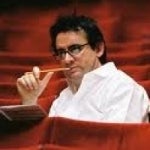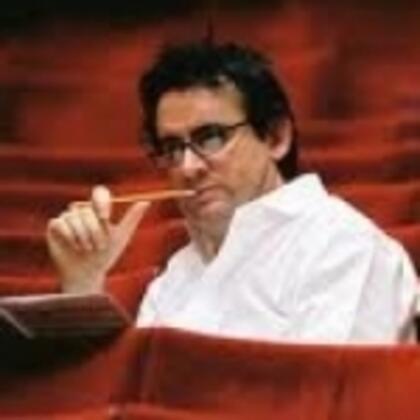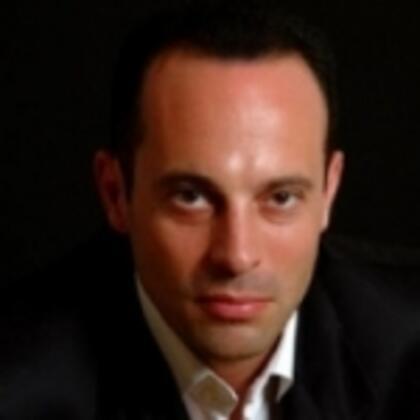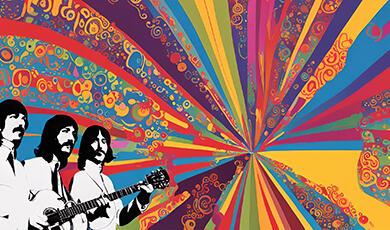14 February 2013
Darkness Audible: Benjamin Britten at 100 –
Middle, 1945 - 1970
Dr Paul Kildea
[Music plays]
Britten’s first canticle written very much in the sway of the discoveries that he had been making since the late 1930s and very early 1940s, concerning the music of Purcell. I talked slightly about this last time, but it is worth remembering what exactly he thought about the music and how it changed the way he wrote his own.
“One of my chief aims is to try and restore to the musical setting of the English language a brilliance, freedom and vitality that has been curiously rare since the death of Purcell. In the past hundred years, English writing for the voice has been dominated by strict subservience to logical speech rhythms, despite the fact that accentuation according to sense often contradicts the accentuation demanded by emotional content. Good recitative should transform the natural intonations and rhythms of everyday speech into memorable musical phrases, as with Purcell, but in more stylised music. The composer should not deliberately avoid unnatural stresses if the prosody of the poem and the emotional situation demand them, nor be afraid of a high-handed treatment of words which may need prolongation far beyond their common speech length or a speed of delivery that would be impossible in conversation.”
It does not take long, listening to the opening of that canticle…
[Plays]
…where you have the two voices out of vertical alignment, if you like, and this untrammelled writing in the middle of it, which is all as written by the way – it is meant to sound like that! But it really is incredibly unmoored by this stage, and it was the idea that Britten would have two voices go apart and then bring them back at the end in that lovely choral that you hear. So, he was really literal about the influence that a composer such as Purcell could have just on speech and on rhythm and he thought that this was a real problem in the nineteenth century. English composers, who were far more interested in a hymnbook mentality and approach towards harmony, which then affected the way that they approached poems and affected then the settings that they made.
It is also extraordinary in that, which is an incredible love letter to Peter Pears, his partner by then of around eight years, that of course, the critics, when it was first performed, noted nothing untoward about this rather obvious, I would have thought, statement of commitment and love and attraction. Instead they commented on the lovely acoustic and the beautiful piano writing which reminded me of - the one funny critic I think I just laughed out loud at was, when I was Artistic Director of Wigmore Hall, I invited the wonderful soprano Anja Silja to come and to talk about her life and career and also to perform a few things. She had a cold and was not very well and so begged the forgiveness and understanding of the audience. The critic, in the Financial Times, I think, said, “I found this much easier to do by concentrating on the pattern in the Wigmore Hall’s carpet”!
The critics noticed this freedom and this great vitality in Britten’s writing, and of course, because of the time, did not comment very much on the sub-text of Britten’s operas, which already, by this stage – do not forget that we have had the performance of “Peter Grimes” in 1945, we have had the performance of “Rape of Lucretia” in 1946, and we are about to have the performance of “Albert Herring”. So, all of these deal with, in some way or another, the incredible betrayals at the heart of human behaviour.
Betrayals were happening in Britten’s own life. Now, this is a photograph from December 1946. It is interesting because, from what I spoke to you about last week, about the performance, the premiere of “Peter Grimes” we know that it was a fairly rough and tumble affair and that the orchestra was not really up to playing it, the singers were not really up to singing it, and the staging was pretty cramped and not much money spent on it. So, Britten’s predictable response, possibly, because even by then, even by now, he is developing a very thin skin and prickly response to any criticism or perceived lack of support – Britten’s response is to, in December, 1946, is to get together a number of his colleagues from the performance of “Grimes” and also, in this instance, the performance of “Rape of Lucretia” in Glyndebourne, and to discuss what they were going to do.
Glyndebourne. John Christie had actually put a lot of money into both the first production of “Lucretia” and then taking it on tour. It is very interesting that this was Britten’s idea. He thought that it was important that opera be toured to the provinces, which is something that he had learned in the Second World War doing these tours himself, where he would go round and play on rackety pianos and present repertory that people would just simply never have heard before in those places. So, his idea was that Glyndebourne – this is incredible prescient – was a portable brand that could be exported, and John Christie thought it might be a portable brand but on someone else’s dime, thank you, and he lost an absolute packet, and so what you have here is the foundations, or almost the formation of the English Opera Group, which was to be run independent of Glyndebourne.
You have Pears sitting next to Britten, Joan Cross, and you have got John Piper there, etc. So you have got a really pretty extraordinary group there, and it is around this time that he is thinking about this canticle that he will set and this opera company that will be formed and funded partly by the Arts Council.
The English Opera Group is a slight sadness I think in Britten’s life because, for a period of about fifteen years, it really did prevent him from doing what he really should have been doing, which is just composing, or, in this instance, posing for a Life magazine photograph! He did most of his composing walking on the beach and thinking about things. I mean, he did of course have to sit down, but not posed quite as elegantly as that.
So, the Opera Group actually made him, he thrived on it. He thrived on the organisation and doing the bills in his head and writing things down and planning things on little scraps of paper. He would be away on tour, and the telegrams and the letters and the phone calls would come through and he would have to sort of plan for the year to come and to deal with whatever the latest crisis he had just encountered.
The fact remains that it really did take him away from developing a sort of relationship with the emerging company at Covent Garden. That in itself is interesting because we take it all for granted now that this is London, this is the capital, and would have an intensive and successful metropolitan opera scene, but it is not the case, and the touring that Britten witnessed in the 1930s in England showed that opera was still a pretty primitive art form in this country, and certainly the appreciation of it.
But that all changed. It changed for two things: the first production of “Peter Grimes” in ’45; and then also a feeling at exactly this time from John Maynard Keynes, who thought that the vanquisher, that Britain should have an opera company to match anything on the Continent. So these two things are happening in parallel, and what does Britten do? Unfortunately, I think he chooses the wrong thing, and he decides that standards are not high enough at this new company at Covent Garden and that he wants to branch out on his own. So he branches out twice, do not forget: first of all in 1946 when he goes down to Glyndebourne and that falls to pieces; and then again at the end of ’46 and into ’47 where they form the new company.
But there are some interesting things along the way, two of which are the success of David Webster, who was the first director of the company at Covent Garden, the success of him in attracting Britten back to the house a number of times at Covent Garden. Now, later, Britten would say, look, the problem was only that the standard was not very high and there was actually no one to write for at Covent Garden, and that is partly true and partly not true, and he said, had I known how quickly a company would have emerged at Covent Garden, I might have sort of just stayed there and written for it and emulated the relationship that Strauss had with Dresden or [Violli] with La Scala. So he did not – he sets out on his own in this period.
It is curious though, these two episodes where Britten is brought back into the opera house at Covent Garden, and the funny thing is that they highlighted tension between Britten and Pears. Pears was actually much more comfortable living in the rough and splendour of London – he was a metropolitan man and enjoyed all the excitement that came with that.
Here they are in the High Street of Aldeburgh with Mr Baggott, the butcher and, again, a very beautifully posed photograph. He had a housekeeper, and Britten did not actually know the difference between one end of a carrot and the next. This is already in place by the late-‘40s, a tension between the pull of the metropolitan, if you like, in Pears’ life and the attraction of the micro-politan in Britten’s life.
The two occasions where he manages to step out of that are really illustrative of a shift also in English thinking in the 1950s, and the first of these occasions was of course the commissioning and first performance of “Billy Budd”, which I believe to be his greatest opera. It was again another happy chance here, that E.M. Forster had written about, the novella by Melville, Bill Budd, sailor, and that Britten had of course got to know Forster a little bit after 1945 and so it was Forster that was invited to come in and join in on this operatic venture. But it was David Webster in Covent Garden that was really pushing him, and it becomes very much an Establishment, if you like, it is commissioned by Arts Council money, nowhere near equalling the money that Stravinsky managed to extort from La Scala for “The Rake’s Progress” in the same year, but it was still a decent commissioning fee. It was very much put on – by then Britten is a pre-eminent composer, with a libretto by one of the grand old men of English letters, it had choreography by [Cranko], etc. etc. – this was a affair.
That is the first of these, “Billy Budd” – it is not a great success, but still, it is enough of a critical success in places for Britten to think that this return to grand opera was something worthwhile pursuing. So, in 1952, on holiday with the Earl of Harewood, they start talking about national opera and what that means. I actually think that is a very odd concept, the idea of national opera, but they talked about it and what they were for each different country, and they came up with Meistersinger for Germany, and they came up with Aida, bizarrely, for Italy, and they said, well, you know, what is it for England? Of course, there was not one, and so Britten decided to write it.
It was a very telling commission because he decided also that he would only undertake it if it was part of the official Coronation celebrations, and so therefore that it was a commission, more or less, from the Queen herself, and that is a shift in his thinking because, by now, this outsider who had been stamping his feet on the sidelines in 1930s literary and artistic England is now shifting very much closer and closer towards the Establishment Britain, if you like.
The piece is interesting for a number of reasons: one, because he tried to do a number of things for a number of different interested groups. First of all, he tried to write music in what was now his “middle period” – this mature, dislocated, Purcell-inflected, slightly modal, with hinges of bitonality style of music that he was writing at this stage. He wanted to keep true to that, but at the same time, he wanted to reflect the Elizabethan life of the subject of “Gloriana”. Do not forget, he is writing it about Elizabeth I, the subject that they settled on, having dismissed the idea of writing on Henry VIII, probably for logical reasons! So, he wanted to reflect that, and he does that in a number of ways. First of all, he does it the series of masques – there is a masque scene where the choral dancers are sung by the chorus. He does it in a really brilliant movement towards the end of Act II, where he has his own musical language dominating, ultimately, this rather Elizabethan sound that he emulates in a modern orchestra. Then he does it in these two lute songs, which you probably know – they are rather famous – and gets the sounds of Elizabethan life, but also very much the sounds of Dowland, which was influencing him at this stage, another of his discoveries. So, here then is the second of these lute songs, “Happy Were He”…
[Music plays]
Harewood later said, of all the operatic disasters that he knew of, or that were known of, this was really one of the worst! There is not much to dispute in that. It was seen as too down, it was too sad an idea and too human a portrait to celebrate the Coronation of Queen Elizabeth II, and in some senses, that is true. Britten was interested in the private aspects of her life and thoughts, which he contrasted with the more ceremonial aspects which people were hoping for, and unfortunately, if they thought they were coming for a re-enactment of Merry England, they were sadly mistaken and found, in the end of this picture, of an aging, bald Queen, toothless, lusting after the young Earl of Essex, whom she eventually has to sign his death warrant for. So, it was seen as something incredibly dour for such an important occasion.
The failure of it is interesting for a couple of reasons. The first is that, in the Coronation’s list, Britten is appointed OM – that is a very prestigious thing, and you have then this paradox almost of the insider/outsider, working very closely, having dinner with the Queen, writing a piece for her Coronation, but at the same time, wanting to have the privilege of throwing mud from the sidelines, if you like.
There is an interesting thing that happened, as I started to say before, about 1940s/1950s Britain, and it was highlighted by the American sociologist, Edward Shils, where he just said he had never seen before, since the Court of the Mandarins, an intellectual or an intelligencia that was so comfortable with the aristocracy or the Establishment perhaps, and he just said where even in the space of one generation, what had happened to these ‘30s leftist poets that had been stamping their feet and critiquing society with such vehemence – what had happened to them in the space of one generation?
Now, Auden, whom I talked about last time, of course was very aware of the potential for this and had said, in 1939, oh, I am going to leave England because otherwise I would be sucked up by the Establishment. Britten seemed to want to have it both ways, which was, on the one hand, to have his tea with the Queen, but on the other hand, still write works that had very troubling undertows to them.
The way he decided to do this, in the wake of the failure of “Gloriana”, was to spend more time on his opera group, the English Opera Group, and the Aldeburgh Festival. The Aldeburgh Festival was his way of controlling product, if you like, and it was formed in one of their bright ideas on tour in 1947, where they were touring over on the Continent – this is Pears, Eric Crozier was there, working on a libretto with Britten, and Britten himself, and they just said it is madness that we are having to drive these great distances and tour to different countries to perform music – why do we not have our own festival, our Aldeburgh Festival and just invite a few of our friends? Gloriously, they had good friends so the standard of what went on in this Festival was pretty good, but it was an incredibly primitive place in which to try and shoehorn a new festival. What you have here is the Jubilee Hall, which is a former ice-skating rink, which they turned into an opera house, a very improbable opera house, for the occasion. They had a church just up the hill in which they did recitals and that was more or less it, you know. They did not have the beautiful concert hall that we now know of – that did not come until 1967.
He is squeezing his ideas into this because it allowed him to be in charge and not have to deal with the incompetent bureaucrats and all those people that he thought really did not actually understand music, and it also reinforced this notion that we talked about last time, that there was something Continental about the way Britten wanted to approach music-making and composition, and that was only possible, he thought, if he was actually in charge of it. Otherwise, other people would be involved and lessen the impact.
So, in the wake of the 1953 debacle, with this audience full of dignitaries who did not know how to behave at the opera or did not like what they were encountering, Britten thought, okay, I am going to do more and more for Aldeburgh. One of the pieces that he had put to one side – oh, I put that in because he is smiling which is not a strictly fair characterisation, but this is at the premiere of the “Spring Symphony” in Holland, and it reinforces that idea of having a great success on the Continent that he wanted to replicate when he came home, and these incredible autograph-hunters and him just ecstatic with the premiere of this work, which is actually being sung this Sunday at Festival Hall. It is not done very often. It is an unusual piece of writing, but a very effective one.
One of the pieces he had to put aside at the time was a work for the English Opera Group, and it is quite revealing. He had to then again write at great speed when it came down to it because it was a commission for the Venice Biennale, and he had to find a topic very quickly, and the topic that he plumped for was a Henry James novella, “The Turn of the Screw”. He had heard it in a radio adaptation in the 1930s, or late 1920s, and had been incredibly moved by this haunting ghost story, and he had decided it was the perfect opera to set, and of course it was in some senses – a very small cast, very limited setting, so it was perfect for the Opera Group, and for Aldeburgh.
But it is interesting for a number of reasons, one of which is, as a composer, he tended to do all his thinking not standing like that at the piano, but, as I said last time, he would do his thinking in walks on the beach, etc., work out his ideas and then come down and put them down onto paper very quickly. He would use an eraser, but very few extra sheets of manuscript. But this was one where he actually did have a lot of trouble, and it was with his last minute decision to write a prologue for this opera. You all probably know, and we will get to the prologue as it stands, but it is worthwhile just having a listen to what he came up with to begin with, that shows you a little bit about the speed at which he wrote and the wholesale revision that he undertook this time round. So this is the draft prologue that he wrote for his opera of 1954, “The Turn of the Screw”…
[Music plays]
So incredibly different, incredibly different from him at this stage…
The person who did record his great ups and downs in this period was Imogen Holst. She was a remarkable creature, and we think less of her now as a performing musician, which she was, because she spent so much of her time, first of all, working with Britten in the 1950s and very early 1960s, and then of course promoting her father, Gustav Holst’s music. She was possibly slightly in love with Britten. She was certainly completely infatuated with him in his company. She recorded at this stage an incredible retinue of people working with Britten, coming through the house on the seafront in Aldeburgh and also the routine, the sheer hard work of a composer who was at his desk at eight or eight-thirty in the morning, just slogging away at whatever piece he was working on at that time. She also could describe in great detail the drinks that they would have, the brandy, the whisky, the gin and tonic following a board meeting – all of these things. It was really life devised in sort of an English 1920s detective story I think.
He was, in this period post the extraordinary success of “The Turn of the Screw”, which was a real hit for a while there, in the mid-1950s and a hit for the English Opera Group, but he was still contracting his association with or his dealings with the music establishment as a whole. That comes across in a number of works that he wrote in the late-1950s and early-1960s. Part of it is, at the back of his mind, he has this dictum from Frank Bridge that he should be trying to pare down his music, and you can hear that even in the two examples there, particularly the final version of “The Turn of the Screw”, where he comes up with this extraordinary atmosphere of hissing lamps as we are sitting down, gas-lamps, as we are sitting down to enjoy this ghost story, and he comes up with that amazingly foreboding atmosphere in this prologue, which is completely absent, I think it is fair to say, in the draft Mark just sang so beautifully. So he was coming up with ideas of trying to, instead of pack his music out, actually compact it down, and the works that I am thinking of where this changed remarkably were helped along the way by the ballet that he wrote in 1955/56 for Covent Garden, “The Prince of the Pagodas”, which had, the orchestra for “Gloriana”, a very sort of large and expanded sound world that he was experimenting with.
So, he has decided to start to contract things, and even he learnt this from Bridge, but he also had the idea of Mahler, if you have ever performed any Mahler or enjoyed listening to Mahler’s music. He can write it for fantastically large orchestras, but actually, what you often get is this sense of chamber quality, the idea of thin textures amidst so many people on a stage, and the piece that he experimented almost on Mahlerian ideas so well-known to us all is “The War Requiem”.
“The War Requiem” is both an experiment along the Mahlerian lines that I was talking about, using very large forces, but learning how to manage them in often chamber sonorities, but it is also his final repost to the people like Edward Shils, who would have thought that he was actually far too close to Establishment thinking in the 1950s, because he decided to write a piece as a commissioned work for the new cathedral to be consecrated next to the bombed cathedral at Coventry – he decided to write this work. They left it completely open to him. They offered him the hundred pounds or whatever it was – it was a church commission, after all! And they left it open to him – they said it can be a symphony, it can be a cantata, it can be anything like that, but Britten had been thinking, from around the time of the late-1950s of writing what he called a very sad European affair, a work celebrating or highlighting a very sad European affair, and it was this idea of pacifism. Now, of course, I was talking last week how the pacifism when he was writing “Peter Grimes” actually did cause him to be seen as an outsider, but by 1948 or so, there was no longer any stigma attached to being a conscientious objector or a pacifist, and so he decided in this commissioned work in the late-1950s that what he would do is write a big mass, but he wanted not just to leave the mass to speak unattacked, if you like. He wanted to have a commentary inserted into it, and that is where he came up with the really beautiful idea of interpolating the poems of Wilfred Owen, the First World War poet, who was famously killed just before the end of the War – and he wanted to use them as a commentary on the Latin text of the requiem mass, which was going to be performed by the large orchestra. So this was the Mahlerian conceit. He decided to use the Latin in the very large orchestra. He decided to have a small chamber orchestra with a tenor and a baritone singing the Wilfred Owen, and then, for good measure, a boys’ choir tucked away in the organ loft, and he wanted all of those things to reflect the other, and it was through this work that he decided that he could both represent the War dead, build a monument to them, if you like, in this huge undertaking, and then also to point fingers at those who had let Wilfred Owen’s generation walk into such muddy slaughter in the First World War. So, it was his way of having his cake and eating it, both acting out almost as Edward Shils said he did, which is accepting commissions from the great and the good, having tea with the Queen, but also then turning round and pointing a finger and saying, no, this was not good enough.
One great example of how this technique worked in “The War Requiem” is in the Agnus Dei, in which the chorus sings the Latin text and then you have of course the tenor singing a Wilfred Owen poem which contradicts in places the Latin, you know, “Lamb of God, you take away the sins of the world, have mercy on us.”
[Music plays]
Part of this retreat was his move in the late 1950s to a house away from the seafront and this was also part of his retreat from public responsibility almost as a composer.
Here he is playing tennis with Laurens Van Der Post. It is a big house, probably about seven bedrooms at the time, swimming pool, tennis court, but it allowed him to get away from the prying eyes, he called them, of the people who had come to accept his fame and the fame this composer, and he found that galling after a while.
What you have in the 1960s also is a retreat, in some senses, from his relationship with Peter Pears. It is partly to do with an emotional distance that had grown as the ‘50s went on. It is partly that their routines were so different, this aspect that I talked about before of Peter Pears really enjoying the metropolitan life and Britten hating it, and it is partly of course that composing is such a solitary activity. But Britten was keen in this stage on the cellist, Mstislav Rostropovich, whom he heard for the first time in 1960, and it was Rostropovich who excited Britten’s compositions in this era. It is partly also that it meant that, if you have “The War Requiem” in 1962, that is the large major work, concert work, if you like, for Pears in this decade, and instead, you have this string of works for Rostropovich: three cello suites, a sonata, and a symphony for cello and orchestra.
It is interesting as well that this man who had been so inspired by poetry since he was a young boy had finally decided to embrace absolute music, if you like, to move away from text as a crutch. But before he did so, there was a work that exemplified his, if you like, farewell to the metropolitan life, a piece he also wrote with Harewood in mind for Peter Pears, and it was his “Nocturne”.
It was this notion of anthologising different poems to bring about an overarching narrative that he had first started doing in the early-1930s and we talked a little bit about. “A Boy was Born” is an example of that. It was here that he decided to do much the same thing.
So you have these two different Brittens at this stage: a Britten who is excited by absolute music, a Britten who is moving away slightly emotionally from his partner since 1939, Peter Pears, and a Britten actually just wanting to explore new sonorities.
I think the concert hall that he built in 1967 helped change that.
This move away from the metropolitan became more and more important. It became important for him then to find a venue. Do not forget, the small, dinky little ex-skating rink, seating 300 people only, was no longer appropriate when you are having artists like Rostropovich come and perform at the festival, and so they find this place, which was just down the road from the old mill that he had bought in 1938 and refurbished and lived in when he came back in 1942 from America. He had found this mill that was operational up until 1965/66, and in ’66, they clambered over it and thought that could make quite a good concert hall, and indeed it did, which was a concert hall with a really beautiful acoustic, would seat 800 people, fit a full orchestra, if you like. So, his thinking, even in this stage, has shifted away from the opera that had driven him so sort of ferociously since 1945 or even the couple of years beforehand.
Opened by the Queen, burned down, not by the Queen, but burned down on the opening night of the 1969 Festival, very tragic, but rebuilt completely in the space of a year. So this is what is happening. This is the carpenter working on the first version of the Maltings, before it burnt down, and Britten hearing the acoustic for the first time. If you have not been there, it is a really incredible acoustic, a really glossy sound, but it is very precise – you can still hear it. And you can see Pears, and Derek Sugden I think has just been cut out of the picture, hearing the magic of that acoustic for the first time.
Britten is now moving in a new direction in this period, his music becoming slightly more austere, the idea of writing for Rostropovich, a man who could literally play anything, more interesting to him than exploring some of the poetry and opera that had stimulated him since the 1930s.
As his farewell, before we get into what comes, in my mind, in the most interesting part of his life, which is the last six years of his life, he did write, as I said, this farewell to Peter Pears. Now, they remained a very committed couple and there were some very interesting works that were to come for Pears in this last period, but he wrote this anthology of night poems, if you like, called his “Nocturne”. A lot of people think this is a rather austere piece and that actually it is far inferior to the “Serenade” that he wrote, do not forget, in the early 1940s, but I find it actually a more compellingly constructed piece, and he uses a ritornello that returns throughout each, and he talked about the idea of night poetry not just being about almost happy nocturnal nightscapes, but actually being incredibly dangerous as well. He decided to set one of the Shakespeare Sonnets to finish the piece, which we will perform, but I thought that what he wrote when he met Richter, Sviatoslav Richter, in the same period that he met Rostropovich, he wrote about what music meant to him. He rarely put these things down on paper, he just thought music was meant to be a shared and experienced phenomenon, but he wrote this, and I think that it applies to the piece that Mark’s about to sing.
“The magic comes only with the sounding of the music, with the turning of the written note into sound, and it only comes, or comes most intensely, when the listener is one with the composer, either as a performer himself or as a listener in active sympathy. Simply to read a score in one’s armchair is not enough for evoking this quality. Indeed, this magic can be said to consist of just the music which is not in the score. Sometimes one can be quite daunted when one opens the Winterreise – there seems to be nothing on the page. One must not exaggerate - the shape of the music in Schubert is clearly visible. What cannot be indicated on the printed page are the innumerable small variants of rhythm and phrasing which make up the performer’s contribution. In the Winterreise, it was not possible for Schubert to indicate exactly the length of rests and pauses or the colour of the singer’s voice or the clarity or smoothness of consonants. This is the responsibility of each individual performer, and at each performance he will make modifications. The composer expects him to – he would be foolish if he did not, for a musical experience needs three human beings at least: it requires a composer, a performer, and a listener, and unless these three take part together, there is no musical experience.”
[Music plays]
And where this led him…you will see next week – thank you!
© Dr Paul Kildea 2013


 Login
Login









